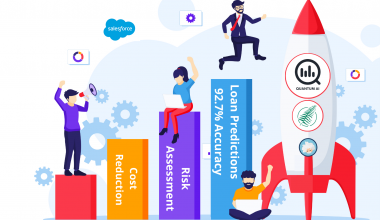The State of Artificial Intelligence (AI) in 2023
The exploration of Artificial Intelligence (AI) dates back to mid-20th century, where computer scientists experimented with the concept of creating machines that could think and learn like humans. Fast forward to 2023, AI has been transforming industries through many different applications and use cases, including the finance industry. Applying AI to the finance industry, financial institutions can now generate new insights, enhance data accuracy, automate manual processes, and improve customer experiences – enabling better efficiency and effectiveness in the long run.
According to a research conducted by McKinsey, the top three use cases of AI include Service Operations Optimisation (24%), Creation of New AI-based Products (20%), and Customer Service Analytics (19%). Service Operations Optimisation has taken the top spot in the past four years – where organisations use AI to improve the services provided by an organisation, while maximising the use of resources and minimising costs. This includes process improvement, capacity planning, quality assurance, performance management, customer experience management, and more.
Applications of AI in Finance
Applying AI to optimise service operations in the finance sector, financial institutions can enhance the business functions that are integral to their day-to-day operations. Recent advancements in technology, including big data and cloud computing, alongside the growth of the digital economy, have paved the way for the effective implementation of AI systems. A 2020 survey by WEF revealed that 77 percent of financial institutions anticipate high importance for AI in their businesses within the next two years. McKinsey estimates the banking sector’s potential value from AI to reach an impressive $1 trillion.
Below are some use cases of AI in finance, as well as market leaders who have adopted AI to strengthen their business models:
- Customer service/support: AI-powered chatbots and virtual assistants can provide personalised customer service and support 24/7 – reducing the costs for customer support. Supervisors who leaned on off-site intensive supervision during the pandemic may also delve into AI/ML-supported tools and processes in the post-pandemic landscape.
For instance, JPMorgan Chase implemented AI-powered chatbots to provide customer support, as well as an AI-powered virtual assistant to help employees with routine tasks.
- Trading and portfolio management: AI-powered algorithms can analyse market data and execute trades faster and more efficiently than humans. AI also helps to extend wealth advisory services by delivering personalized and focused investment advice to a broader audience, inclusive of low-income populations.
For instance, Vanguard uses AI to develop investment strategies, manage their investment portfolios, and provide customers with financial advice powered by AI insights – to make more informed investment decisions.
- Loan underwriting: Institutions can use AI to analyse credit scores, financial history, and other essential information in the loan application to score applicants and assess their credit worthiness. This enables lenders to more effectively evaluate default and prepayment risks. Research findings highlight that AI/ML has the potential to decrease banks’ losses on delinquent customers by as much as 25 percent (Khandani, Adlar, and Lo 2010). Additionally, the precision of automated financial underwriting systems in predicting defaults proves advantageous for underserved applicants, leading to heightened approval rates for borrowers (Gates, Perry, and Zorn 2002).
One example is Capital One – an American bank specialising in credit cards and loans, used AI to develop credit scoring models to improve their loan underwriting processes. They also use AI to personalise their marketing campaigns to offer targeted product recommendations to their customers.
- Regulatory Compliance: Leveraging AI/ML technologies, particularly in the analysis of unstructured data and consumer behaviour, proves instrumental in minimizing false positives within AML/CFT alerts. By focusing on accuracy, financial institutions can allocate resources more efficiently, directing attention towards cases with a higher likelihood of suspicion.
Unlock New Possibilities with AI
With market leaders like JPMorgan Chase, Vanguard, and Capital One incorporating AI to strengthen their business models – we know that AI is here to stay. However, the financial sector’s embrace of AI/ML also introduces other risks and challenges such as robustness of the AI algorithm, new cyber risks, and privacy issues. Financial institutions that have yet to embark on their AI journey, or do not have the time or resources to start innovating from scratch do not have to worry. You can still gain a competitive advantage through available solutions that can be further tailored to your organisation’s needs – like Quantum by Fern Software.
Quantum by Fern Software is a loan decision engine powered by Salesforce for rapid and accurate loan application decisions, with a lightning fast and accurate prediction rate of 92.7%. This will greatly help financial institutions to achieve greater efficiency and lower operational costs required from the manual processing of administrative documents.
AI is expected to become a significant driver that can further fortify the organisation’s processes, business models, and customer successes – and you can kickstart the journey with Quantum here.






